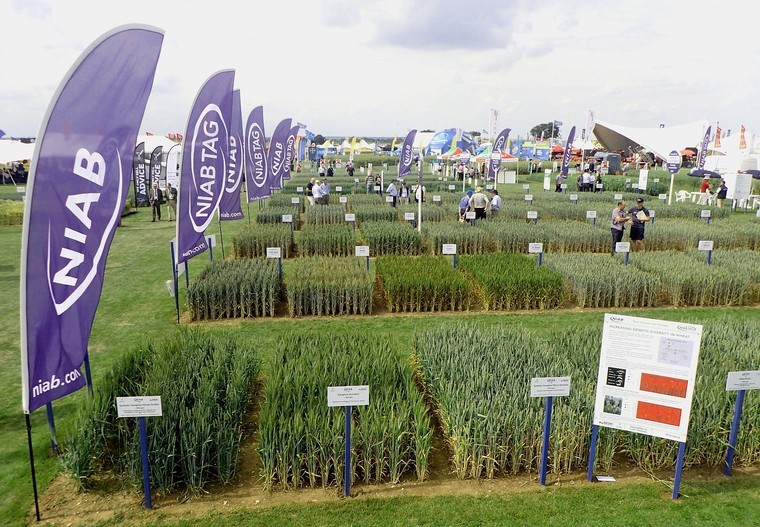NIAB is bringing the Cereals Event to the farmer’s front room with mix of online videos and webinars featuring NIAB specialists and advisers direct from the show plots near Duxford in Cambridgeshire.
Over 125 different crop and variety plots had been planned on the stand, providing a backdrop to the latest technical advice and research in variety choice, independent agronomy, soil and rotation management, crop genetics and data science. The variety demonstration area includes 32 winter wheat and 24 winter oilseed NIAB winter wheat variety plots at the 2020 Cereals Event siterape varieties, either already established on the AHDB 2020/21 Recommended List or candidates.
NIAB Technical Director Bill Clark says: “Our untreated variety demo plots are always a top attraction at Cereals, giving growers a head start on their variety selection for next season, with differences in disease resistance and performance between the varieties clearly evident. But we don’t want growers to miss out in any way this year. So, our wheat and oilseed rape variety specialists Clare Leaman and Colin Peters will be going onto site, taking viewers by video through the plots as if they were there with them.”
The variety plots are just the start. This year NIAB had planned a larger agronomy area, including a demonstration of inputs versus yield in winter wheat, new fungicides, advice on grass weed control and trials work on soil amendments. And, as this year is the International Year of Plant Health, there was a focus on NIAB’s plant pathology expertise with the latest developments on The NIAB Cereals Event standyellow rust and field pathogenomics with the UK Cereal Pathogen Virulence Survey team and the RustWatch project, alongside advice and support in disease diagnostics.
“The aim is to cover all these topics, and more, with videos and webinars, available on the Cereals Live website, and NIAB’s own Virtual Event Hub at www.niab.com, alongside downloadable guides, topic sheets and information posters. It is part of our commitment to support UK farmers and agricultural businesses through this extraordinary crisis, adapting and finding alternative ways of working with our customers where we can whilst ensuring the welfare of our employees and keeping to government guidelines,” explains Mr Clark.
The NIAB event trials team, led by Shaun Coleman, is continuing to manage the mix of variety, agronomy and crop science plots on the event field right through to the virtual event on 10th and 11th June. Some of the spring legume and break crop plots have not been drilled at the Cereals Event site but will be covered by NIAB’s own demonstration site at its Cambridge farm, alongside grass weed control advice using plots at NIAB’s National Black-grass Centre at Hardwick, near Cambridge.
The Soil Hole
The 2020 NIAB Soil Hole was to focus on rotational choices with the crop plots along each side of the pit allowing a comparison of above and below ground crop growth. Visitors may not be able to step down into the soil hole this year, but Dr Elizabeth Stockdale, the NIAB Farming Systems team and NIAB Innovation Farm’s Dr Lydia Smith will be covering rotations and more in the videos and with supporting material.
“Rotational decisions are often made with limited thought about the impact on soil,” says Dr Stockdale. “Spring and autumn sown herbal leys allow growers to consider their rotational diversity options and we will also take a look at some crop alternatives to winter oilseed rape, including linseed, canary grass, naked oats and ahi-flower, and a companion cropping with spring beans.”
NIAB is working closely with CFE and Agricology, to provide practical ways of enhancing soil biology, soil monitoring and making soils more resilient to extremes of weather with farmers, researchers and other industry specialists. A programme of webinars will give everyone a chance to share their experiences with improving soil health and the resulting environmental and economic benefits.
Summary
The NIAB stand at the Cereals Event is known for providing the latest technical advice and research in variety choice, independent agronomy, soil and rotation management, crop genetics and data science. The full list of exhibits planned for 2020, which will now be covered by plot-based videos, webinars, downloadable guides, topic sheets and information posters, includes:
- Variety demonstration plots – providing expert advice on winter wheat variety choice for 2020/21 with 32 established and new candidate varieties plus 24 winter oilseed rape varieties with information on variety choice for spring oilseed rape, linseed, peas and beans.
- Advice on crop protection and nutrition including the latest information in new fungicide chemistry, new strategies and a comparison of wheat fungicide programme options;
- Research and information on rotations, cultivations, tillage and soil management from NIAB specialists, including a look at alternative break crops to winter oilseed rape;
- Understanding the risk factors for weed control in winter oilseed rape, winter wheat and spring cereals – including black-grass, rye brome and broad-leaved weeds;
- Plant disease research and new diagnostic techniques
- NIAB crop research; using new plant breeding tools and technologies to help shape the future of our crops, including nitrogen use efficiency. From GM to gene-editing, re-synthesis to MAGIC – our demonstration plots show how wheat breeding research, and the use of new techniques, is improving the yield, efficiency and resilience of global crop production;
- Discovering the science and skills behind NIAB’s unique and long-established plant phenotyping and seed certification services, testing over 1,000 new varieties every year;
- NIAB TAG Membership services including the latest crop production advice and farmer-led research, field days, agronomy trials results, unique regional variety information and weekly agronomy updates through the season.




